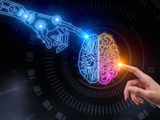AI and the Beginning of the UBI Era

AI and the Beginning of the UBI Era
Professor Predicts the Future of Work in AI Era
Sergey Karayev, Berkeley Computer Science PhD and Head of AI for Turnitin.com, spoke at the ASU-GSV Summit Conference and spoke about the future of Ed Tech. When asked what 10-15 years looks like, he spoke plainly, essentially saying: In the future, there will only be two types of people: those who absorb UBI and entrepreneurs who fully utilize artificial general and super intelligence and robotics.
First, let's clarify those words:
Universal Basic Income (UBI) is a government program in which every adult citizen receives a set amount of money regularly. This payment is unconditional, meaning it is given regardless of income, employment status, or wealth. The purpose is to provide a financial safety net and ensure everyone has a basic level of income to meet their needs.
Artificial General Intelligence (AGI) refers to a type of AI that possesses the ability to understand, learn, and apply knowledge across a wide range of tasks at a human-like level of intelligence.
Unlike narrow AI, which is designed for specific functions (like playing chess or recognizing faces), AGI would be capable of reasoning, problem-solving, and adapting to new situations without task-specific programming.
Essentially, it aims to replicate the flexible and general cognitive abilities of the human brain. Sam Altman, CEO of OpenAI, believes that agents will begin doing work this year.
Artificial Superintelligence (ASI) refers to a hypothetical form of AI that surpasses human intelligence in all aspects—reasoning, creativity, social intelligence, and problem-solving. Unlike Artificial General Intelligence (AGI), which matches human capabilities, ASI would be vastly more capable, potentially improving itself recursively and rapidly outpacing human control or understanding.
ASI raises profound ethical, existential, and safety concerns, as it could make decisions and take actions with far-reaching consequences beyond current human foresight. Think of ASI like a CEO who had their finger on the pulse of every single worker, and every single worker was capable of Michelangelo levels of creativity, the coding capacity of Linus Torvald(Inventor of Linux), Bjarne Stroustrup (inventor of C++), and Alan Turing combined, and the manufacturing genius of Ford, Apple and Boston Dynamics.
With the deployment of say 10,000 AGI agents, all focused on accelerating the development of ASI, tuning algorithms ever so slightly, and iterating, could condense years' worth of work into a fraction of the computational time. A simple version of this can be seen with the current generation (already slightly out of date) of models with Google Gemini CoScientist: a tool that utilizes a multi-agent structure to return possible novel scientific ideas!
This brings us back to Universal Basic Income. Critics often argue that UBI is infeasible in developed countries; however, recent evidence challenges that view. A large-scale randomized controlled trial(an experiment) in Germany found that large unconditional cash transfers, €1,200 per month for three years (30% of the median German monthly wage), increased life satisfaction, mental health, and sense of purpose by using reliable measurements from the WHO-5 well-being index, a screener for depression, and the PSS stress scale.
Participants reported increased autonomy, greater time with friends, more sleep, and even prosocial behaviors like charitable giving and helping family. Crucially, these effects persisted beyond the end of the program.
In a world where AGI and ASI automate vast swaths of labor, this kind of unconditional support may be necessary and profoundly empowering, allowing individuals to reclaim agency and well-being in a post-work economy.
Read more on their look into the future:

About the author
Connor Oswald, Ph.D